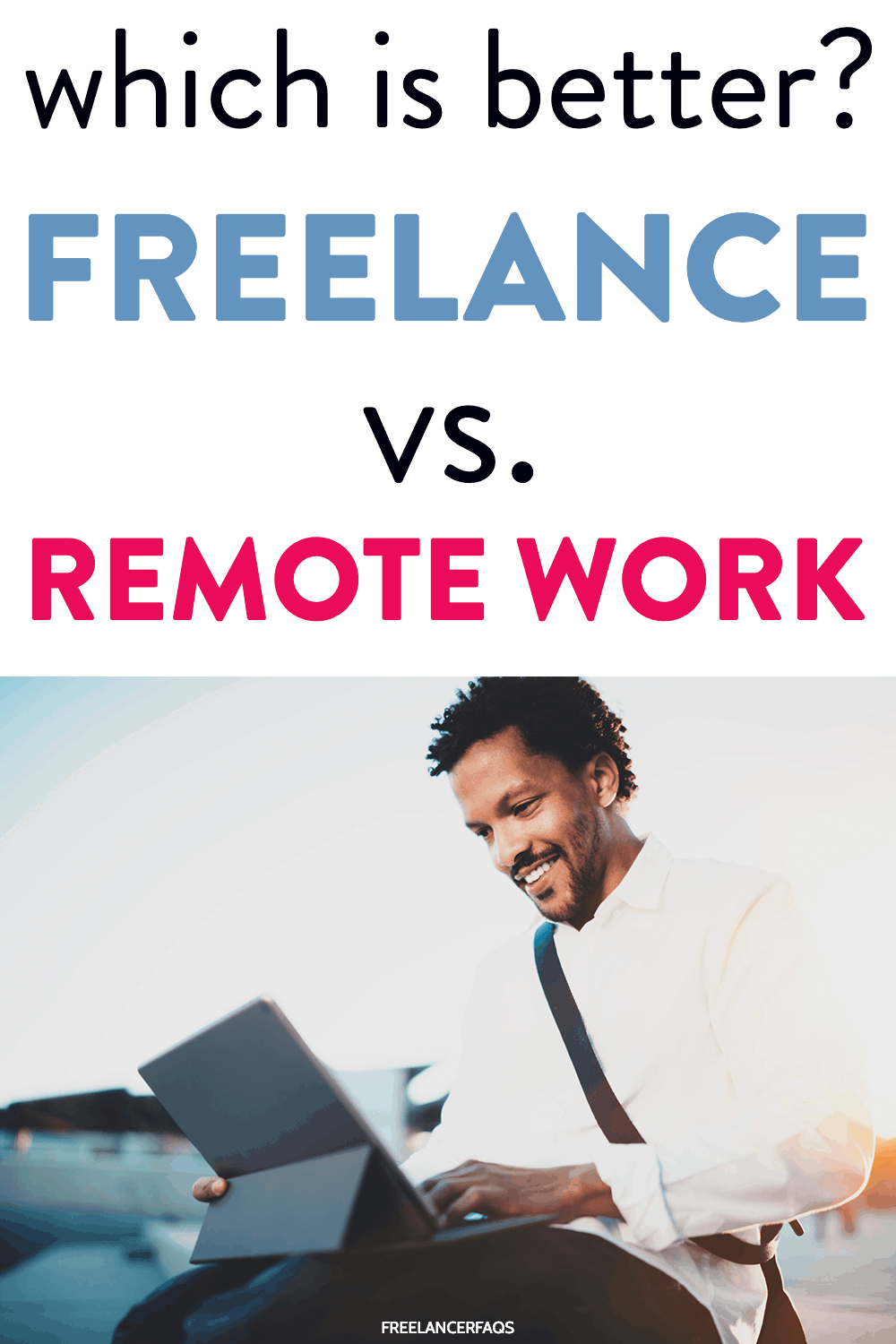It’s a given that the COVID-19 pandemic has caused at least some form of change in your life.
One of the most notable is the increased focus on working from home.

Indeed, the benefits that remote operations provide workers — that sense of flexibility and the potential for a better work-life balance among them — may mean that you’re starting to examine how you can more permanently embrace it.
Usually, your choices will come down to two approaches.
You either seek out a full-time position with a business that employs remote workers, or you set yourself up as a freelancer in your field.
While both of these options tend to allow you to work from wherever you wish, they are still very different ways of working and living.
As you make your first steps toward finding the ideal remote career to provide you with success and happiness, it’s worth taking the time to examine the two so that you can make more informed decisions.
Let’s review a few of the key areas of consideration and what the differences are between these approaches to work.
Flexibility
It is likely that one of the main reasons you’re considering a remote or freelance job is the potential for flexibility.
Being able to avoid operating from a physical office space certainly gives you more time that you might otherwise have spent commuting, and you can work from comfortable surroundings.
While it’s true that both can make for careers that are more supportive of your home life and the way you want to structure it, there are some considerations to take into account for working freelance or being employed remotely.
Remote workers are, in essence, still full-time members of company staff.
The only difference is that they don’t have to work in the office. Many companies in this position consider the opportunity to work from home in itself an exercise in flexibility, and some are certainly open to discussing scheduling.
However, you certainly don’t tend to have free reign to choose your working hours — you’ll usually be expected to operate on the same schedule as your colleagues, taking the same breaks and days off.
Company cybersecurity policies may even require that you work consistently from your home or a designated co-working space, which means operating from cafes occasionally or from a different country may be out of the question.
Freelancing, on the other hand, tends to be more generally flexible.
You are not an employee, rather you are a contractor and the companies you work for are your clients. Depending on your line of work this results in your having control over your own schedule.
Unless you are working in a customer service role, your hours and days of operation are more likely to be entirely up to you as long as you get the work done.
The caveat to this tends to be deadlines. You can choose to work a shorter week or wrap your projects around your travel plans, but you will still be expected to bring your work in on the deadline set by your clients.
So, you have to balance out your freedoms by how disciplined you are to provide results on time.
Independence
 One of the most valuable aspects of a freelance or remote working career is the opportunity for a little independence.
One of the most valuable aspects of a freelance or remote working career is the opportunity for a little independence.
Being in an office environment can feel a bit restricting for those who like the opportunity to spread their wings a bit, explore their curiosity, and implement working practices that they know are most effective for them personally.
Yet each approach to this has varying levels of independence available.
Freelancing is the ultimate in independent career paths.
You are your own boss, essentially running your own business, and you can make choices about who you work with and how you interact with them in ways that employees can’t.
That said, this independence means that you are out there on your own, and the responsibility is entirely on you to establish client relationships and identify prospects.
You need to regularly put effort into updating and honing resources such as your LinkedIn and other social media profiles to present yourself at your best and communicate the skills clients will find valuable.
Remote workers have a relatively limited amount of independence.
Generally, your freedom will come from the fact that you may not be as closely supervised as your in-office colleagues. Which is great, if you consider yourself more self-driven than a worker drone.
Although, there are some businesses that have activity measurement software for remote employees.
You won’t necessarily need to undertake the same kind of networking as freelancers, but you may well be expected to still engage in strict communications protocols in order to keep connected to your team and forge bonds with them.
Stability
The issue that so often comes up when discussing remote or freelance careers is that of stability.
It’s only understandable, particularly in the current climate, that you want to make certain that the path you choose is one that allows you to live comfortably. As such, it’s important to consider how each path has opportunities for a stable income.
Being a full-time remote worker certainly seems to be the most stable option on the surface, and tends to come with the most support and resources.
Your employer has the responsibility to provide you with the tools you need, for example.
This might be requesting technological equipment that helps you to do your job, or organizational furniture to keep your home office in order.
They will also generally be expected to provide you with benefits such as compensation if you are injured in the course of your duties. However, it’s also important to remember that being an employee of a business is not always a guarantee of long-term work; the business climate can change, sometimes unexpectedly.
Freelancing might not provide you with a guaranteed, steady income from a single source.
However, like any business, you can maximize your income over time by taking steps such as diversifying your skillset and negotiating as you build a higher profile.
Your stability as a freelancer is often dependent upon your ability to boost your reputation and keep providing excellent and innovative results.
Indeed, unlike remote workers, you may be able to fund early retirement or a career change by selling your freelance business in the future.
Conclusion
Remote working and freelance careers are more accessible than ever.
Choosing which is more suitable depends on your need for flexibility, your desire for independence, and your approach! Good luck!



Leave a Reply